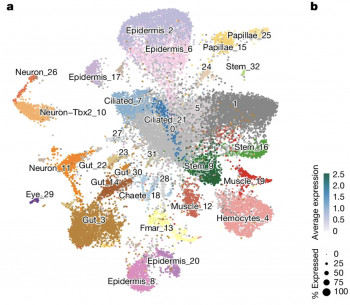Welcome to The Centre for Evolutionary and Functional Genomics
The Centre for Evolutionary and Functional Genomics (CEFG) is home to 28 active research groups that use cutting-edge technology to further our understanding of complex biological systems and processes. The Centre for Evolutionary and Functional Genomics is at the forefront of research on non-model organisms studying gene-regulation underpinning development and behaviour, evolution of adaptive phenotypes, social organisation, and biological complexity.
Specifically, we build on traditional model systems to transpose multi-omics approaches to non-model organisms. Our interdisciplinary approach combines molecular biology, microscopy, computational biology, and in vivo experiments to study biological processes from the molecular level to a macroevolutionary scale.
Collectively, we seek to gain a functional understanding of how genomes generate the complexity of life on Earth. With this knowledge, we tackle the global challenges of biodiversity loss, climate change, food security, disease prevention and healthy ageing.
Research in the Centre for Evolutionary and Functional Genomics is highly collaborative, maintaining partnerships with leading institutions worldwide and fostering a global network of researchers to advance our understanding of genomics and biology. The centre benefits from access to state-of-the-art imaging, genomic and animal facilities. Our genome research is also an essential component of our postgraduate education, being central to the “Bioinformatics”, “AI in the Biosciences”, and “Biodiversity and Conservation” MSc programmes at QMUL.
News
Recent Publications
- Functional characterization of neuropeptides that act as ligands for both calcitonin-type and pigment-dispersing factor-type receptors in a deuterostome
Cong X Liu H Liu L Castelán NE Jones KG Egertová M Elphick MR Chen M
Elife, Elife vol. 13
21-11-2025 - Bayesian Selection of Relaxed-clock Models: Distinguishing Between Independent and Autocorrelated Rates
Panchaksaram M Freitas L dos Reis M
Systematic Biology, Oxford University Press
21-11-2025 - Adenine DNA methylation associated with transcriptionally permissive chromatin is widespread across eukaryotes
Romero Charria P Navarrete C Ovchinnikov V Xu L Sarre LA Shabardina V Ksiezopolska E Casacuberta E et al.
Nature Genetics, Springer Nature, 1-11.
18-11-2025
Recent Grants
- Evolutionary biophysics of spiralian asymmetric divisions
Chema Martín-Durán
£320,000 Human Frontier Science Program (HFSP)
01-09-2025 - 31-08-2028 - SMALLGIANT MSCA PF 2024 De Mendoza Soler / Oliviera
Alexandre De Mendoza Soler
£217,591 EU Commission - Horizon Europe
01-09-2025 - 31-08-2027 - ADB513: Genomic basis of ash health after five and thirteen years’ exposure to ash dieback CFP25_A56
Richard Buggs and Richard Nichols
£130,092 Department for Environment, Food & Rural Affairs (DEFRA)
01-04-2025 - 31-03-2028







